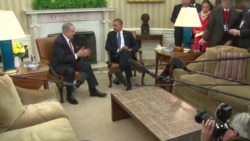STATE DEPARTMENT —
President Obama's push to limit Iran's nuclear program includes a promise to Israel and Saudi Arabia that he will not allow Tehran to develop nuclear weapons. But Israeli Prime Minister Benjamin Netanyahu says Israel will never be secure if Iran continues to enrich uranium.
In their meeting at the White House this week, Obama told the prime minister that his commitment to blocking Iran from atomic weapons is absolute.
But U.S. officials involved in talks on Iran's nuclear program say there is general agreement that Iran will ultimately be allowed to continue enriching some uranium for civilian research at levels far below weapons-grade.
Netanyahu said "that would be a grave error."
"It would leave Iran as a threshold nuclear power," he said. "It would enable Iran to rapidly develop nuclear weapons at a time when the world's attention is focused elsewhere."
Iranian Foreign Minister Mohammad Javad Zarif says his country has never sought nuclear weapons.
"There was first a perception that this was nothing but a façade for a weapons program and an illusion that it could be brought to an end through pressure and intimidation," he said.
With Israeli defense officials vowing to intercept any possible threat on any day in any place, former U.S. ambassador Adam Ereli says Washington's promises on Iran only go so far.
He said, "Obviously Israel is the most directly concerned of all the parties by Iran's nuclear program because it represents a very real, very direct threat to Israel."
U.S. Secretary of State John Kerry says attacking Iran does not guarantee security.
"Those who say strike and hit need to go look at what happens after you've done that," he said. "Whether that permanently eliminates the program or opens up all kinds of other possibilities including Iran leaving the nuclear proliferation treaty, not even allowing IAEA inspectors in, not living under any international regimen."
It is part of Washington's new approach to Iran, says American University professor Hillary Mann Leverett.
"Kerry has long been open to, long looked for a way of conflict resolution in the Middle East that would include, not exclude the Iranians," she said.
Despite objections from long-time U.S. allies Israel and Saudi Arabia. Mann Leverett says, "The United States is going to have to say: 'Yes you are our allies but you can not stand in the way of critical U.S. interests.' Just as when Nixon went to China we kept Japan and Taiwan as allies but we didn't let them stand in the way of the biggest geopolitical prize of the century: going to China. The same thing has to happen with Iran."
Promising to lead the push for tougher action if Iranian nuclear talks fail, Obama follows up his White House meeting with the Israeli leader with a trip to Riyadh later this month for talks with Saudi King Abdullah.
In their meeting at the White House this week, Obama told the prime minister that his commitment to blocking Iran from atomic weapons is absolute.
But U.S. officials involved in talks on Iran's nuclear program say there is general agreement that Iran will ultimately be allowed to continue enriching some uranium for civilian research at levels far below weapons-grade.
Netanyahu said "that would be a grave error."
"It would leave Iran as a threshold nuclear power," he said. "It would enable Iran to rapidly develop nuclear weapons at a time when the world's attention is focused elsewhere."
Iranian Foreign Minister Mohammad Javad Zarif says his country has never sought nuclear weapons.
"There was first a perception that this was nothing but a façade for a weapons program and an illusion that it could be brought to an end through pressure and intimidation," he said.
With Israeli defense officials vowing to intercept any possible threat on any day in any place, former U.S. ambassador Adam Ereli says Washington's promises on Iran only go so far.
He said, "Obviously Israel is the most directly concerned of all the parties by Iran's nuclear program because it represents a very real, very direct threat to Israel."
U.S. Secretary of State John Kerry says attacking Iran does not guarantee security.
"Those who say strike and hit need to go look at what happens after you've done that," he said. "Whether that permanently eliminates the program or opens up all kinds of other possibilities including Iran leaving the nuclear proliferation treaty, not even allowing IAEA inspectors in, not living under any international regimen."
It is part of Washington's new approach to Iran, says American University professor Hillary Mann Leverett.
"Kerry has long been open to, long looked for a way of conflict resolution in the Middle East that would include, not exclude the Iranians," she said.
Despite objections from long-time U.S. allies Israel and Saudi Arabia. Mann Leverett says, "The United States is going to have to say: 'Yes you are our allies but you can not stand in the way of critical U.S. interests.' Just as when Nixon went to China we kept Japan and Taiwan as allies but we didn't let them stand in the way of the biggest geopolitical prize of the century: going to China. The same thing has to happen with Iran."
Promising to lead the push for tougher action if Iranian nuclear talks fail, Obama follows up his White House meeting with the Israeli leader with a trip to Riyadh later this month for talks with Saudi King Abdullah.





